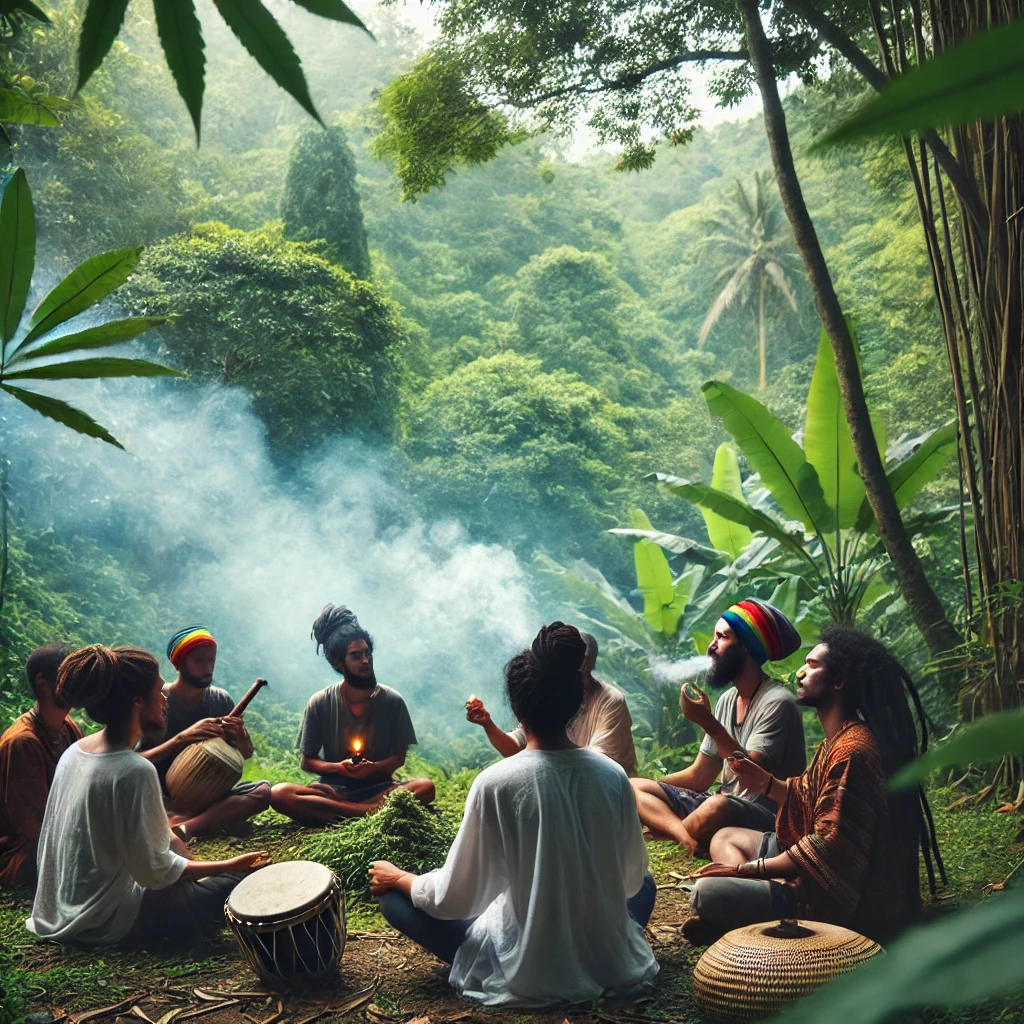Cannabis, often referred to as ganja in Rastafarian culture, plays a deeply spiritual and symbolic role in Rastafarianism. For Rastas, ganja is not just a plant; it’s a sacred herb used in rituals, meditations, and as a tool for spiritual connection to Jah (God). The history of cannabis in Rastafarianism is intertwined with its cultural, religious, and healing significance, stretching far beyond its recreational use.
Di Spiritual Use of Ganja
In Rastafarianism, ganja is considered di “wisdom weed” or di “holy herb.” It’s believed to bring spiritual enlightenment and deeper understanding of Jah’s will. For Rastas, using cannabis in meditation or reasoning sessions (spiritual discussions) allows dem to elevate their minds, reach a higher state of consciousness, and connect more deeply with Jah.
Biblical Justification for Ganja
Rastas often refer to di Bible to support their use of cannabis, pointing to passages like:
- Genesis 1:29 – “And God said, Behold, I have given you every herb bearing seed, which is upon the face of all the earth…”
Rastas interpret this as Jah giving humanity the right to use herbs like ganja for spiritual and medicinal purposes. - Revelation 22:2 – “And the leaves of the tree were for the healing of the nations.”
This verse is seen as a reference to di healing properties of ganja, which Rastas use for both physical and spiritual well-being.
Ganja in Rasta Rituals
Cannabis plays an important role in Rastafarian rituals, especially during reasoning sessions. In these gatherings, Rastas smoke ganja in a communal setting while engaging in deep discussions about life, spirituality, and di teachings of Haile Selassie I. The herb is seen as a tool to bring clarity of thought and unite those present on a higher spiritual plane.
Ganja is also used in Niyahbinghi celebrations, where Rastas chant, drum, and meditate in a collective effort to resist Babylon (the oppressive system). In these ceremonies, smoking ganja helps participants focus their minds on Jah and maintain their spiritual strength.
Ganja as a Healing Herb
Beyond its spiritual significance, ganja is also revered for its medicinal properties. Rastafarians believe that ganja can heal both the body and mind. Many Rastas use the herb to treat ailments such as stress, pain, and insomnia, embracing its natural healing powers as part of their holistic way of life.
In keeping with di Rastafarian principle of Ital living – a natural, healthy, and unprocessed lifestyle – ganja is viewed as a gift from Jah to help Rastas maintain physical and mental balance.
Ganja and Resistance to Babylon
For Rastafarians, di use of ganja is also a form of resistance against Babylon, which represents di materialistic, oppressive system of Western society. Babylon’s laws, which criminalize ganja, are seen as an attempt to control and suppress Rasta spirituality. By continuing to use ganja in their rituals, Rastas assert their independence from Babylon and affirm their right to practice their beliefs freely.
Rastas have long faced persecution for their use of ganja, particularly during Jamaica’s colonial era, when authorities tried to suppress the movement. Despite these challenges, Rastas have maintained their spiritual connection to ganja, using it as a symbol of defiance and spiritual freedom.
Ganja in Modern Rastafarianism
Today, cannabis remains central to Rastafarian culture. While it has gained wider acceptance in many parts of the world, for Rastas, its use is still primarily spiritual. As the global conversation around cannabis continues to evolve, Rastafarians remain committed to their belief in its sacredness, viewing ganja as a divine tool for healing, meditation, and resistance against Babylon’s influence.
Conclusion
For Rastafarians, ganja is far more than just a plant – it’s a symbol of spirituality, healing, and resistance. Whether used in meditation, rituals, or for healing, ganja remains an essential part of Rasta culture, reflecting their deep connection to Jah and their ongoing fight against di forces of Babylon. Its history in Rastafarianism is a testament to di enduring strength of their faith and di power of nature as a spiritual force.

